-

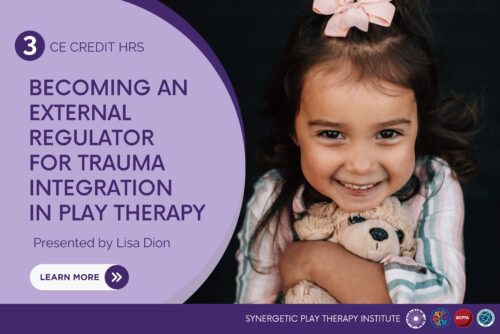 Research in neuroscience and interpersonal neurobiology sheds light on the need for the play therapist to act as the external regulator supporting the child to move towards the intensity they are experiencing allowing for integration. This 3 hour video course explores this need during trauma integration for two primary reasons: 1) The child need to borrow the play therapist’s regulatory capacity as they work through their traumatic thoughts, feelings and sensations in play therapy and 2) The play therapist’s ability to regulate themselves during the intensity increases the capacity for presence and attunement with the child, while simultaneously supporting the health and longevity of their own nervous system. Without the ability of the play therapist to become the external regulator for the intensity that arises during trauma integration, both the child and the play therapist are at risk for emotional flooding and high levels of dysregulation in their nervous systems. Over time, this can significantly impact a play therapist’s longevity in the field, as well as the ability to stay attuned and present to a child in sessions. This course is a recording of a 3 hour live webinar with Trusted Provider Network. See course details below.
Research in neuroscience and interpersonal neurobiology sheds light on the need for the play therapist to act as the external regulator supporting the child to move towards the intensity they are experiencing allowing for integration. This 3 hour video course explores this need during trauma integration for two primary reasons: 1) The child need to borrow the play therapist’s regulatory capacity as they work through their traumatic thoughts, feelings and sensations in play therapy and 2) The play therapist’s ability to regulate themselves during the intensity increases the capacity for presence and attunement with the child, while simultaneously supporting the health and longevity of their own nervous system. Without the ability of the play therapist to become the external regulator for the intensity that arises during trauma integration, both the child and the play therapist are at risk for emotional flooding and high levels of dysregulation in their nervous systems. Over time, this can significantly impact a play therapist’s longevity in the field, as well as the ability to stay attuned and present to a child in sessions. This course is a recording of a 3 hour live webinar with Trusted Provider Network. See course details below. With their changing brains and hormones, finding ways to integrate play with pre-teens and teens can at times just feel “Awkward”. Learn how to navigate therapy with our clients who are no longer children, but also not quite yet adults. From twelve-year-olds to seniors in high school, adolescence is a time filled with change. This can make the notion of bringing play therapy to this population a challenge. Do we play? Do we talk? Do I ask questions? What do I do?" As such, many therapists find themselves at a loss with this age group, feeling just as confused as they do! In this workshop, play therapists will delve into the mysteries of the teenage mind as we bust myths and glean insight into how to best offer therapeutic support. Using neuroscience, Developmental, Synergetic, and Systemic theories, participants will explore how to navigate this "awkward" and sometimes "overwhelming" developmental stage using an eclectic framework of non-directive and directive play therapy approaches. Understanding how to assess the teen's emotional age, an area often missed when working with this population, will also be covered as a way to understand how to incorporate play into the therapy process. The information presented is designed to open minds and hearts as participants uncover the wisdom of the changing brain and the wisdom of the teenage years. Through lecture, demonstration, and discussion, this workshop will deconstruct this mysterious stage and support play therapists in discovering how they can help mature and remodel the teenage brain, while supporting movement towards the discovery of the authentic self- the cornerstone of the development of a teenager's identity. To get a sense for the course, check out this short video below:See course details below.
With their changing brains and hormones, finding ways to integrate play with pre-teens and teens can at times just feel “Awkward”. Learn how to navigate therapy with our clients who are no longer children, but also not quite yet adults. From twelve-year-olds to seniors in high school, adolescence is a time filled with change. This can make the notion of bringing play therapy to this population a challenge. Do we play? Do we talk? Do I ask questions? What do I do?" As such, many therapists find themselves at a loss with this age group, feeling just as confused as they do! In this workshop, play therapists will delve into the mysteries of the teenage mind as we bust myths and glean insight into how to best offer therapeutic support. Using neuroscience, Developmental, Synergetic, and Systemic theories, participants will explore how to navigate this "awkward" and sometimes "overwhelming" developmental stage using an eclectic framework of non-directive and directive play therapy approaches. Understanding how to assess the teen's emotional age, an area often missed when working with this population, will also be covered as a way to understand how to incorporate play into the therapy process. The information presented is designed to open minds and hearts as participants uncover the wisdom of the changing brain and the wisdom of the teenage years. Through lecture, demonstration, and discussion, this workshop will deconstruct this mysterious stage and support play therapists in discovering how they can help mature and remodel the teenage brain, while supporting movement towards the discovery of the authentic self- the cornerstone of the development of a teenager's identity. To get a sense for the course, check out this short video below:See course details below.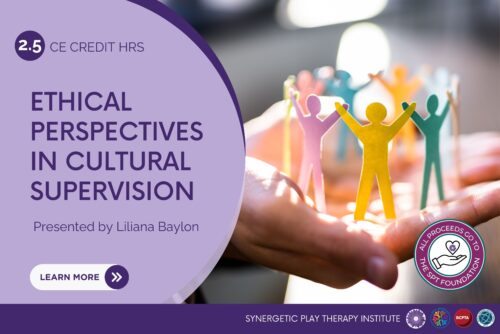 In today's diverse and globalized world, effective mental health supervision requires more than theoretical expertise; it demands a profound understanding of ethical considerations and cultural dynamics. Join us for a dynamic course designed to equip mental health and play therapy supervisors with the essential knowledge to navigate the complexities of working across cultures ethically and effectively. This course will delve into critical cultural and ethical topics that will transform your supervision practice, including:
In today's diverse and globalized world, effective mental health supervision requires more than theoretical expertise; it demands a profound understanding of ethical considerations and cultural dynamics. Join us for a dynamic course designed to equip mental health and play therapy supervisors with the essential knowledge to navigate the complexities of working across cultures ethically and effectively. This course will delve into critical cultural and ethical topics that will transform your supervision practice, including:- Fostering an Inclusive & Respectful Supervisory environment: Gain understanding and develop cultural competence and sensitivity so that your supervisees feel seen and supported.
- Exploring Ethical Dilemmas in Cross-Cultural Supervision: Discuss and identify solutions to common dilemmas from a cultural and ethical lens.
- Effectively Support Supervisees: Learn how to be culturally aware and inclusive of your supervisees from diverse backgrounds, promoting their professional development and well-being.
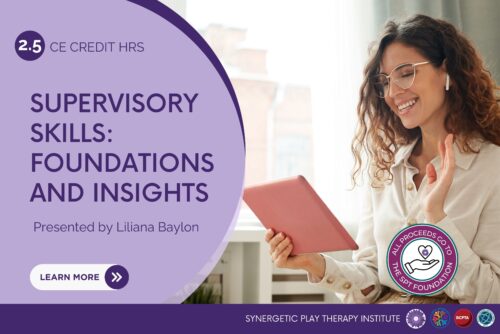 Are you looking to elevate your play therapy supervision practice, gain confidence, and ensure you're fully equipped to support your supervisees? Join us for this transformative experience where you’ll gain practical tools and in-depth knowledge to feel more prepared and confident in your role as a supervisor. It’s about giving you the structure you need to navigate the often complex world of supervision. This course will delve into critical topics that will transform your supervision practice, including:
Are you looking to elevate your play therapy supervision practice, gain confidence, and ensure you're fully equipped to support your supervisees? Join us for this transformative experience where you’ll gain practical tools and in-depth knowledge to feel more prepared and confident in your role as a supervisor. It’s about giving you the structure you need to navigate the often complex world of supervision. This course will delve into critical topics that will transform your supervision practice, including:- Principles & Theoretical Frameworks: Ground your supervision in solid theoretical foundations to ensure ethical, effective guidance.
- Clarifying Roles & Relationships: Understand the distinctions between supervision and consultation—what have you agreed upon, and how can you maintain clarity in these roles?
- Gatekeeping & Power Dynamics: Explore the importance of gatekeeping in supervision and how to handle power dynamics with awareness and grace.
- Navigating Ethical Dilemmas: Learn to recognize and manage ethical dilemmas, set clear boundaries, and know your limitations—where do you turn when you need guidance?
- Tailoring Supervision to Specific Standards: Each practice setting, whether private practice or agency work, has different standards and guidelines. We’ll discuss the important questions to ask and considerations to keep in mind regardless of location or regulatory environment.
- Addressing Language Barriers: Discuss ethical considerations when your supervisee speaks a different language or when English isn't their first language.
- Empowering vs. Instructing: Learn how to support growth and empowerment in your supervisees by encouraging curiosity and reflective practice, rather than simply telling them what to do.
 Helping children learn how to regulate is essential, but without first strengthening the child's interoceptive sense, regulation may not be successful. This experiential workshop offers various opportunities to explore how play can develop this fundamental part of the sensory system. As play therapists, there is an understanding that regulation and co-regulation are essential skills that must be developed in order to have successful relationships and manage emotions, and are essential for trauma integration; however, what many play therapists may not fully understand is that there is a prerequisite that needs to be in place for regulation skills to be effective. What has been understood for years in the world of Occupational Therapy is now becoming a primary focus of education for play therapists. This important understanding is that the child’s interoceptive sense, the 8th sensory system that is responsible for letting the brain know how the body is doing, must be developed first before a child can successfully regulate and co-regulate. Without the development and strengthening of the interoceptive sense, a child may have all kinds of regulation knowledge and tools but will not be able to read their own body cues to know when to use any of them. Examples such as knowing when to use the bathroom, when to take a deep breath, when to ask for help, the ability to read non-verbal cues, knowing when emotions are feeling overwhelming, etc. all rely on interoception. This playful workshop is designed to help play therapists learn what the interoceptive sense is and how to use play to develop interoception in their child clients setting the stage for successful regulation and co-regulation. Play therapists will have fun experientially exploring this fundamental part of the sensory system! (This course is a recording of a 2 hour live webinar held in November 2023) See course details below.
Helping children learn how to regulate is essential, but without first strengthening the child's interoceptive sense, regulation may not be successful. This experiential workshop offers various opportunities to explore how play can develop this fundamental part of the sensory system. As play therapists, there is an understanding that regulation and co-regulation are essential skills that must be developed in order to have successful relationships and manage emotions, and are essential for trauma integration; however, what many play therapists may not fully understand is that there is a prerequisite that needs to be in place for regulation skills to be effective. What has been understood for years in the world of Occupational Therapy is now becoming a primary focus of education for play therapists. This important understanding is that the child’s interoceptive sense, the 8th sensory system that is responsible for letting the brain know how the body is doing, must be developed first before a child can successfully regulate and co-regulate. Without the development and strengthening of the interoceptive sense, a child may have all kinds of regulation knowledge and tools but will not be able to read their own body cues to know when to use any of them. Examples such as knowing when to use the bathroom, when to take a deep breath, when to ask for help, the ability to read non-verbal cues, knowing when emotions are feeling overwhelming, etc. all rely on interoception. This playful workshop is designed to help play therapists learn what the interoceptive sense is and how to use play to develop interoception in their child clients setting the stage for successful regulation and co-regulation. Play therapists will have fun experientially exploring this fundamental part of the sensory system! (This course is a recording of a 2 hour live webinar held in November 2023) See course details below. Aggression and death are common parts of the play therapy process, yet many therapists don’t have a clear understanding of what to do and how to facilitate intensity. This can lead to inadvertently promoting aggression and low brain disorganization. It can also lead to the therapist feeling beat up, exhausted, and hyper-aroused, ultimately impacting their ability to stay attuned, remain present, and find inspiration in this field. Enter Synergetic Play Therapy! Through an SPT lens, and a heavy dose of neuroscience, this 2-hour course helps therapists learn how to use play in a way that supports regulation – their own and their client’s! See course details below.
Aggression and death are common parts of the play therapy process, yet many therapists don’t have a clear understanding of what to do and how to facilitate intensity. This can lead to inadvertently promoting aggression and low brain disorganization. It can also lead to the therapist feeling beat up, exhausted, and hyper-aroused, ultimately impacting their ability to stay attuned, remain present, and find inspiration in this field. Enter Synergetic Play Therapy! Through an SPT lens, and a heavy dose of neuroscience, this 2-hour course helps therapists learn how to use play in a way that supports regulation – their own and their client’s! See course details below.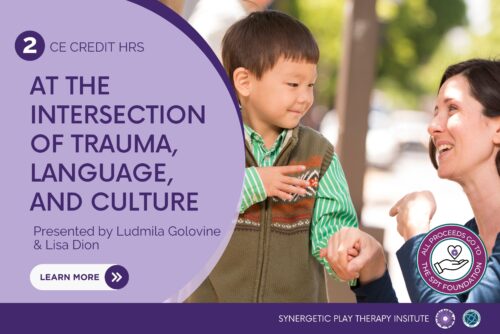 This dynamic, two-hour video course delves into the intricate interplay between trauma, neurocognitive processes, and communication patterns, shedding light on the challenges therapists face when working with survivors of trauma, especially those from culturally diverse backgrounds or with language barriers. Did you know that trauma's profound impact on neurocognitive functioning can significantly influence communication dynamics within therapeutic settings? This, coupled with cultural and linguistic disparities, can pose an added challenge when trying to establish rapport and foster healing with clients, particularly among Limited English Proficient or Deaf/Hard of Hearing individuals! Join Mila Golovine, President & CEO of Masterword. and Lisa Dion, Founder & President of the Synergetic Play Therapy Institute as they navigate the intersections of cultural competency, trauma-informed therapy, and effective communication strategies. You will also get insights into enhancing the therapeutic alliance, fostering better client engagement, and ultimately improving therapeutic outcomes! Key highlights include:
This dynamic, two-hour video course delves into the intricate interplay between trauma, neurocognitive processes, and communication patterns, shedding light on the challenges therapists face when working with survivors of trauma, especially those from culturally diverse backgrounds or with language barriers. Did you know that trauma's profound impact on neurocognitive functioning can significantly influence communication dynamics within therapeutic settings? This, coupled with cultural and linguistic disparities, can pose an added challenge when trying to establish rapport and foster healing with clients, particularly among Limited English Proficient or Deaf/Hard of Hearing individuals! Join Mila Golovine, President & CEO of Masterword. and Lisa Dion, Founder & President of the Synergetic Play Therapy Institute as they navigate the intersections of cultural competency, trauma-informed therapy, and effective communication strategies. You will also get insights into enhancing the therapeutic alliance, fostering better client engagement, and ultimately improving therapeutic outcomes! Key highlights include:- Understanding how trauma affects neurocognitive processes and communication patterns.
- Exploring cultural competence in therapy and its significance in trauma recovery.
- Identifying challenges and strategies for effective communication with clients from diverse backgrounds.
- Best practices for working with Limited English Proficient or Deaf/Hard of Hearing clients.
- Practical techniques to promote therapeutic alliance and engagement.
- Ethical considerations and sensitivity when utilizing interpreters in therapy sessions.
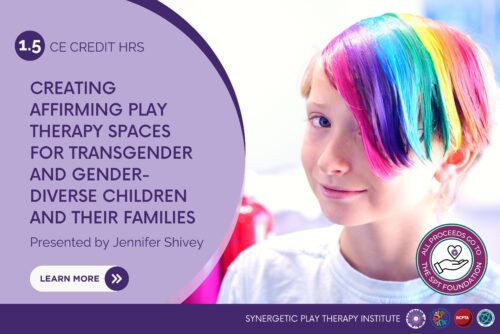 Transgender and gender-diverse children face unique challenges in navigating their identities and experiences. Their families face challenges, too, but can often be fearful of voicing them due to worries about how others may perceive them. Clinicians are often well meaning but can do unintended harm due to the blind spots they are not aware of when working with this population. Play therapy offers a dynamic and effective approach to support these children and their families in understanding and expressing themselves in a safe and affirming environment, given the appropriate knowledge offered by the clinician. This workshop aims to equip therapists with the knowledge, skills, and confidence necessary to provide effective and affirming play therapy for transgender and gender-diverse children - and their families! Scroll down for all of the course details!
Transgender and gender-diverse children face unique challenges in navigating their identities and experiences. Their families face challenges, too, but can often be fearful of voicing them due to worries about how others may perceive them. Clinicians are often well meaning but can do unintended harm due to the blind spots they are not aware of when working with this population. Play therapy offers a dynamic and effective approach to support these children and their families in understanding and expressing themselves in a safe and affirming environment, given the appropriate knowledge offered by the clinician. This workshop aims to equip therapists with the knowledge, skills, and confidence necessary to provide effective and affirming play therapy for transgender and gender-diverse children - and their families! Scroll down for all of the course details!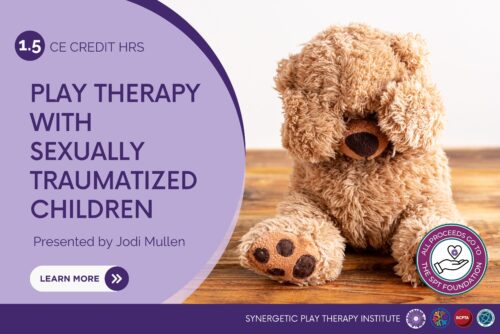 Children who have been sexually traumatized are often in need of our clinical services. Both directive and non-directive play therapy approaches provide these traumatized children with healing and the repair of losses associated with sexual trauma, such as innocence, trust, and appropriate boundaries. In this course you will develop your expertise and become a more effective advocate for your child clients with the knowledge and insight offered through this presentation. You will learn about sexual development in children, the psychological markers of sexual trauma, and the special issues these children present in play therapy, including: consulting with non-offending parents, dealing with the powerful impact of countertransference, and setting limits. Scroll down for all of the course details!
Children who have been sexually traumatized are often in need of our clinical services. Both directive and non-directive play therapy approaches provide these traumatized children with healing and the repair of losses associated with sexual trauma, such as innocence, trust, and appropriate boundaries. In this course you will develop your expertise and become a more effective advocate for your child clients with the knowledge and insight offered through this presentation. You will learn about sexual development in children, the psychological markers of sexual trauma, and the special issues these children present in play therapy, including: consulting with non-offending parents, dealing with the powerful impact of countertransference, and setting limits. Scroll down for all of the course details!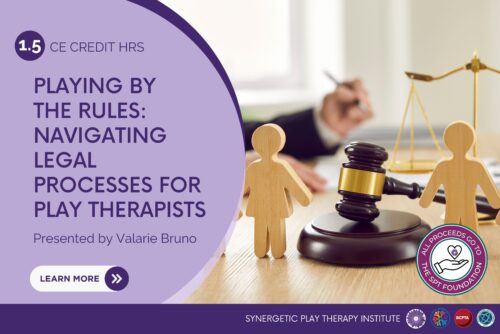 When play therapy intersects with the legal system, play therapists often find themselves in unfamiliar territory. Navigating legal processes can be daunting without proper guidance, leaving therapists feeling uncertain and ill-prepared to advocate for their clients effectively. Learn what you need to know to steer through the legal system with ease and confidence. You’ll leave this presentation empowered to effectively advocate for your clients, ensuring their voices are heard and their needs are met. Scroll down for all of the course details!
When play therapy intersects with the legal system, play therapists often find themselves in unfamiliar territory. Navigating legal processes can be daunting without proper guidance, leaving therapists feeling uncertain and ill-prepared to advocate for their clients effectively. Learn what you need to know to steer through the legal system with ease and confidence. You’ll leave this presentation empowered to effectively advocate for your clients, ensuring their voices are heard and their needs are met. Scroll down for all of the course details!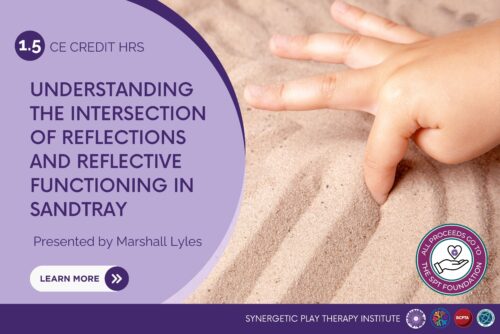 Sandtray therapy prominently features the art of reflecting. In fact, it may be the therapy skill most associated with the craft. However, we can become so accustomed to the language of reflecting that we can lose contact with its intent. In this course, you will explore the skill of reflecting through the lens of the attachment theory concept of reflective functioning. Marshall Lyles will walk you through examples honoring this intersection through use of the sand tray. Scroll down for all of the course details!
Sandtray therapy prominently features the art of reflecting. In fact, it may be the therapy skill most associated with the craft. However, we can become so accustomed to the language of reflecting that we can lose contact with its intent. In this course, you will explore the skill of reflecting through the lens of the attachment theory concept of reflective functioning. Marshall Lyles will walk you through examples honoring this intersection through use of the sand tray. Scroll down for all of the course details!

